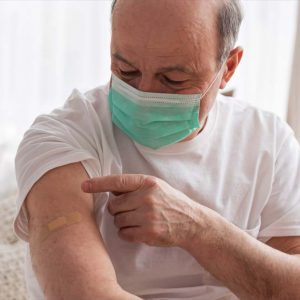Booster Shot: Will You Need A COVID-19 Booster Down The Road?

Booster Shot: Will You Need A COVID-19 Booster Down The Road?
April 21, 2021
So you’ve gotten both your vaccination shots and you’re 2 weeks beyond the second jab. Are you now out of the woods when it comes to being vulnerable to a COVID infection? The data suggest that all available vaccines are overwhelmingly effective in preventing serious illness and death from the coronavirus. In fact, the numbers indicate that the vaccines are up to 95% effective. Nonetheless, as Francis Collins, director of the National Institutes of Health, stated, “These are…vaccines that are fantastically safe and effective. But 95 percent is not 100 percent.”
And in fact, a small number of “breakthrough” infections for people who have been fully vaccinated have been reported in the media and are being tracked by the CDC. In a recent piece in The New Yorker, writer Masha Gessen revealed the psychological unmooring she experienced when she suffered a breakthrough infection after being vaccinated. Such disorientation and distress were also echoed by the many individuals and their families interviewed in a recent Kaiser Health News piece, The Shock and Reality of Catching Covid After Being Vaccinated, in which infected patients and their loved ones describe their months and months of caution and precautions only to become infected after being vaccinated.
In fact, the number of breakthrough infections to date has been minuscule compared to the number of people fully vaccinated. Estimates are that only about 6000 cases have occurred. And experts remind us that such infections are to be expected and should not be cause for alarm. If anything the limited number should remind us of how effective the vaccines actually are. These breakthrough infections also remind us that we are not completely out of the woods yet. Apparently, a little more than 40% of the breakthrough cases have been among people over age 60 and 65% of these infections have been in women. Moreover, these breakthrough infections underscore both the need to carefully track variants among the new infections and carefully continue our proactive measures to mask, distance and hand wash while the virus is still circulating. In that regard, it’s concerning that recent reports suggest we may not, as a country, be doing an adequate job sequencing and tracking new variants as new infections arise, due to differing methods of sample collections across states and insufficient reporting of breakthrough infections to the CDC from certain states. This is especially worrisome, as some people with compromised immune systems or who take immunosuppressant drugs may not mount sufficient immune protection from being vaccinated, and some variants may appear to be more transmissible and may even test the limits of current vaccines.
In the meantime, pharmaceutical companies like Pfizer and Moderna are at work on a follow-up booster shot which more and more seems likely to be needed within a year of receiving your original vaccination. Recently, Pfizer CEO Albert Bourla suggested that a 3rd dose of vaccine would likely be needed and CEO Stephane Bancel of Moderna stated that he anticipated a COVID booster vaccine would be ready by the fall. It’s also anticipated that similar to the flu shot, we may very well require an annual COVID vaccine booster to keep us safe and infection-free. Right now we have data that suggests the current vaccines will create strong immunity for most of us for at least 6 months after receiving the full dose. However, as the breakthroughs remind us, 95% is not 100%, meaning some of us may still be vulnerable even if we’ve been vaccinated, and all of us, vaccinated or not, should continue to take protection- for ourselves and our loved ones.







